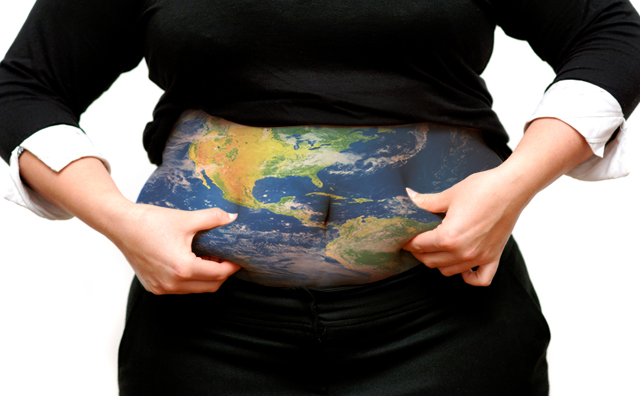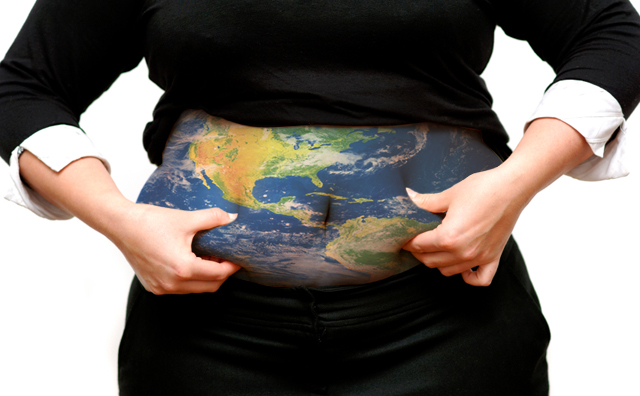 Photo illustration by Tom Twigg/GristYou’ve heard all the reasons before: We drive too much. We eat too much meat and processed food. We spend too much time with plugged-in devices—computers, TVs, air conditioners.
Photo illustration by Tom Twigg/GristYou’ve heard all the reasons before: We drive too much. We eat too much meat and processed food. We spend too much time with plugged-in devices—computers, TVs, air conditioners.
But what problem are we talking about–climate change, or the worldwide rise in obesity?
Both, according to Globesity: A Planet Out of Control?, a book by four public-health researchers who show how climate change and obesity draw from a shared web of roots. Both problems worsen as car culture spreads, desk jobs replace manual jobs, and carbon-intensive foods (including meat) become available to more and more eaters, according to the book, published first in French and this spring in English.
The two issues spread across the planet in similar ways. Those paying attention to climate change know the planet can’t afford for the developing world to emit carbon dioxide at the same levels as the industrialized world. Public-health workers, too, foresee enormous trouble if developing countries adopt the worst dietary and lifestyle habits of rich countries. That shift is well underway, according to Michelle Holdsworth, Globesity’s lead author and a nutritionist with the World Health Organization (WHO) in Montpellier, France.
“A lot of people think of [obesity] as something that’s only in the United States, which we now know is a complete myth,” she said in an interview. “It may have started there, but we now know that one in six people in the whole world are overweight, one in 12 is obese, and there are more obese people in developing, poor countries than there are in developed westernized countries.”
“That’s obviously a matter of concern, because those countries can’t afford to deal with the health consequences of obesity.”
Rates of obesity–defined by the WHO as a body mass index of 30 or higher–are now higher in Germany, Finland, and the Czech Republic than in the U.S., according to data from the International Obesity Task Force (IOTF). The same is true in some Mediterranean countries famed for their healthy diets: Greece, Egypt, and Cyprus. Traditional olive oil-centric diets have become too high in fat for populations that are less active than they used to be, said Holdsworth. And traditional diets are losing ground.
“This has been a shock to people in [the Mediterranean] region who are very proud of their traditional cuisine,” she said. “They’ve just seen a huge transition in what food is available, with processed convenience food replacing their traditional diet.”
Childhood rates
Even more disturbing is the rise in childhood obesity. Again, America was a trailblazer, and again, much of the world is catching up quickly. Childhood obesity rates doubled in the U.S. from 1975 (15 percent) to 1995 (30 percent), according to the IOTF. England’s childhood obesity rate caught up in half the time, from 15 percent in 1995 to 30 percent in 2005. More from the book: “Mediterranean countries are among the worse hit, so that in Spain, Italy, Albania or Greece, we find the numbers of overweight children already climbing to between 30 and 40 percent.”
Exposing this trend was a crucial goal for Holdsworth, who wrote Globesity with Francis Delpauch and Bernard Maire, colleagues at the WHO Collaborating Centre for Human Nutrition in southern France, and Emmanuel Monnier, a science journalist.
“There’s this huge myth, or social stigma, associated with obesity: that it’s just about people overeating, or being greedy, lazy, and not able to control their eating,” said Holdsworth, who taught public health at the University of Nottingham before moving to Montpellier this spring. “So much research shows that’s just not the case. Yes, people do eat more than they need, but the reason why they’re eating more is what we really need to look at. Our argument, and there’s lots of scientific consensus to this, is that it’s more about the environment people live in.”
Globesity‘s message is somewhat at odds with research published in April that concludes overweight people, by requiring more food and energy to transport, produce more greenhouse gases. “Moving about in a heavy body is like driving in a gas guzzler,” one of the two London School of Hygiene & Tropical Medicine authors told the U.K. Sun, which ran the thoroughly lame headline “Fatties Cause Global Warming.”
Blaming overweight people isn’t helpful, said Holdsworth, because it masks the bigger story of why more people are gaining weight. She describes “obesidemic environments,” in which schools and workplace cafeterias offer only high-calorie foods; in which urban design discourages walking; in which government subsidies make fresh produce more expensive than potato chips.
In some sense, this is a classic issue on which the left and the right talk past each other, with liberals emphasizing structural social problems where conservatives see an issue of individual responsibility. For Holdsworth, childhood rates are the crucial distinction.
“Society’s attitudes toward children are not the same as they are toward adults,” she said. “It’s not so easy to blame children who are overweight and say they’re weak-willed. Children are only eating what they’re given, or what’s made available to them.”
Two birds, one stone
So here’s some good news: The problems of obesity and climate change may be connected, but so are many solutions. Rethinking neighborhoods to encourage bicycling and walking (and walking school buses), for example, would help on both fronts. Junk food requires more energy to produce than healthy food, so “junk food taxes,” limits on advertising to children, and clear labeling standards would also help both problems. Simply cutting subsidies that give a cost advantage to junk-food staples like corn syrup could do a great deal. But that requires political courage.
“We’re finding a lot of governments are taking the safe option of saying, ‘We need to educate people so they know what they should do.’ That completely ignores the causes of why people eat what they eat and why they aren’t very active,” said Holdsworth.
Education campaigns on their own rarely change people’s habits, she said. But bans on smoking in public places across Europe have convinced her there is political space for strong actions with public-health benefits.
“It shows that you can really take a radical action—taking away a choice from people—and even smokers are saying how pleased they are,” she said.
All smokers? Of course not.
Globesity‘s enthusiasm for top-down regulation isn’t its strongest point. Smoking restrictions aside, Americans will refuse some measures that might be accepted more readily in Europe, and many developing countries don’t have the infrastructure to execute strict food-labeling standards or other bureaucratic fixes. Still, the book’s strengths—its exploration of how massive, swelling problems feed on countless small sources, its moral vision about children becoming innocent victims—have much to say to the debate on climate change.


